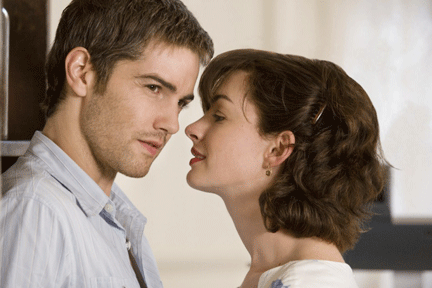
By Joshua Knopp/managing editor
One Day isn’t a movie designed for people who’ll be paying attention at the end.
The film actually takes place over 20 days, all of which are July 15. The film is a scrapbook record of the lives of Emma (Anne Hathaway) and Dexter (Jim Sturgess) with every snapshot taken on July 15. The film spans 1989 to 2009.
Based on an award-winning Nicholas Sparks – wait, that’s wrong – David Nicholls novel, One Day smells strongly of a good story that doesn’t translate well onto film.
Emma and Dexter do a full year’s worth of emotional development in each time skip, resulting in characters that, from the audience’s perspective, only vaguely resemble what they were just a few minutes ago. As they develop into more complete humans, it becomes difficult to attach to either of them.
Because of the time span, different segments of One Day are like entirely different films.
There’s the movie about an inhibited young woman finding herself. Emma establishes problems that have been the main subject of many films early on, and during the few scenes that she has those issues, they are the principal conflict.
But, after only a few sequences and no on-screen soul-searching, her problems just go away.
There’s a movie about a man down on his luck. Rife with predictability and lengthy shots of Sturgess looking sad, this portion of the film is just boring.
Down the stretch, the film becomes an R-rated fairy tale edited for a PG-13 audience. Days go from 20 minutes each of film time to a few seconds, as if to signal the audience that the end is nigh and they can leave if they want.
One Day is capped by an ending that continues for far too long and seems less concerned with tying up loose ends and more concerned with giving couples in the audience more time to make out.
The end result is a film that could have been unique becoming a big clump of clichés.
No matter how many movies One Day tries to be, if that’s what appeals to an individual, there are better options.
A myriad of movies spend more than half an hour on college-age kids finding themselves and late-20-year-olds experiencing hard luck. If it’s a crush on Hathaway or Sturgess, they have much more explicit romances.
Given 1978’s Same Time, Next Year with Alan Alda, One Day probably isn’t even the best romance about a couple whose lives are displayed one day out of every year.
One Day probably shouldn’t be watched past the one day it came out.
Final Take: A pretty standard romance that should have been much more
Those who would enjoy it: Hopeless romantics, sadists
























